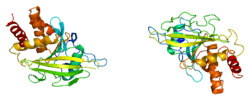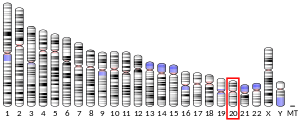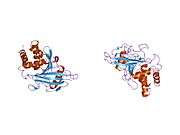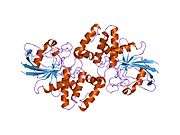PTPRA
Receptor-type tyrosine-protein phosphatase alpha is an enzyme that in humans is encoded by the PTPRA gene.[5][6][7]
Function
The protein encoded by this gene is a member of the protein tyrosine phosphatase (PTP) family. PTPs are known to be signaling molecules that regulate a variety of cellular processes including cell growth, differentiation, mitotic cycle, and oncogenic transformation. This PTP contains an extracellular domain, a single transmembrane segment and two tandem intracytoplasmic catalytic domains, and thus represents a receptor-type PTP. This PTP has been shown to dephosphorylate and activate Src family tyrosine kinases, and is implicated in the regulation of integrin signaling, cell adhesion and proliferation. Three alternatively spliced variants of this gene, which encode two distinct isoforms, have been reported.[7]
Interactions
PTPRA has been shown to interact with Grb2[8][9][10] and KCNA2.[11]
References
- GRCh38: Ensembl release 89: ENSG00000132670 - Ensembl, May 2017
- GRCm38: Ensembl release 89: ENSMUSG00000027303 - Ensembl, May 2017
- "Human PubMed Reference:". National Center for Biotechnology Information, U.S. National Library of Medicine.
- "Mouse PubMed Reference:". National Center for Biotechnology Information, U.S. National Library of Medicine.
- Jirik FR, Janzen NM, Melhado IG, Harder KW (December 1990). "Cloning and chromosomal assignment of a widely expressed human receptor-like protein-tyrosine phosphatase". FEBS Lett. 273 (1–2): 239–42. doi:10.1016/0014-5793(90)81094-5. PMID 2172030.
- Kaplan R, Morse B, Huebner K, Croce C, Howk R, Ravera M, Ricca G, Jaye M, Schlessinger J (October 1990). "Cloning of three human tyrosine phosphatases reveals a multigene family of receptor-linked protein-tyrosine-phosphatases expressed in brain". Proc Natl Acad Sci U S A. 87 (18): 7000–4. doi:10.1073/pnas.87.18.7000. PMC 54670. PMID 2169617.
- "Entrez Gene: PTPRA protein tyrosine phosphatase, receptor type, A".
- den Hertog J, Hunter T (June 1996). "Tight association of GRB2 with receptor protein-tyrosine phosphatase alpha is mediated by the SH2 and C-terminal SH3 domains". EMBO J. 15 (12): 3016–27. doi:10.1002/j.1460-2075.1996.tb00665.x. PMC 450243. PMID 8670803.
- den Hertog J, Tracy S, Hunter T (July 1994). "Phosphorylation of receptor protein-tyrosine phosphatase alpha on Tyr789, a binding site for the SH3-SH2-SH3 adaptor protein GRB-2 in vivo". EMBO J. 13 (13): 3020–32. doi:10.1002/j.1460-2075.1994.tb06601.x. PMC 395191. PMID 7518772.
- Zheng XM, Resnick RJ, Shalloway D (June 2002). "Mitotic activation of protein-tyrosine phosphatase alpha and regulation of its Src-mediated transforming activity by its sites of protein kinase C phosphorylation". J. Biol. Chem. 277 (24): 21922–9. doi:10.1074/jbc.M201394200. PMC 5641391. PMID 11923305.
- Tsai W, Morielli AD, Cachero TG, Peralta EG (January 1999). "Receptor protein tyrosine phosphatase alpha participates in the m1 muscarinic acetylcholine receptor-dependent regulation of Kv1.2 channel activity". EMBO J. 18 (1): 109–18. doi:10.1093/emboj/18.1.109. PMC 1171107. PMID 9878055.
Further reading
- Mustelin T, Hunter T (2002). "Meeting at mitosis: cell cycle-specific regulation of c-Src by RPTPalpha". Sci. STKE. 2002 (115): PE3. doi:10.1126/stke.2002.115.pe3. PMID 11796915.
- Zheng XM, Wang Y, Pallen CJ (1992). "Cell transformation and activation of pp60c-src by overexpression of a protein tyrosine phosphatase". Nature. 359 (6393): 336–9. doi:10.1038/359336a0. PMID 1383828.
- Jirik FR, Anderson LL, Duncan AM (1992). "The human protein-tyrosine phosphatase PTP alpha/LRP gene (PTPA) is assigned to chromosome 20p13". Cytogenet. Cell Genet. 60 (2): 117–8. doi:10.1159/000133317. PMID 1611910.
- Rao VV, Löffler C, Sap J, Schlessinger J, Hansmann I (1992). "The gene for receptor-linked protein-tyrosine-phosphatase (PTPA) is assigned to human chromosome 20p12-pter by in situ hybridization (ISH and FISH)". Genomics. 13 (3): 906–7. doi:10.1016/0888-7543(92)90186-V. PMID 1639427.
- Sap J, D'Eustachio P, Givol D, Schlessinger J (1990). "Cloning and expression of a widely expressed receptor tyrosine phosphatase". Proc. Natl. Acad. Sci. U.S.A. 87 (16): 6112–6. doi:10.1073/pnas.87.16.6112. PMC 54482. PMID 2166945.
- Krueger NX, Streuli M, Saito H (1990). "Structural diversity and evolution of human receptor-like protein tyrosine phosphatases". EMBO J. 9 (10): 3241–52. doi:10.1002/j.1460-2075.1990.tb07523.x. PMC 552056. PMID 2170109.
- Ohagi S, Nishi M, Steiner DF (1991). "Sequence of a cDNA encoding human LRP (leukocyte common antigen-related peptide)". Nucleic Acids Res. 18 (23): 7159. doi:10.1093/nar/18.23.7159. PMC 332805. PMID 2175890.
- den Hertog J, Tracy S, Hunter T (1994). "Phosphorylation of receptor protein-tyrosine phosphatase alpha on Tyr789, a binding site for the SH3-SH2-SH3 adaptor protein GRB-2 in vivo". EMBO J. 13 (13): 3020–32. doi:10.1002/j.1460-2075.1994.tb06601.x. PMC 395191. PMID 7518772.
- den Hertog J, Pals CE, Peppelenbosch MP, Tertoolen LG, de Laat SW, Kruijer W (1993). "Receptor protein tyrosine phosphatase alpha activates pp60c-src and is involved in neuronal differentiation". EMBO J. 12 (10): 3789–98. PMC 413662. PMID 7691597.
- Stover DR, Furet P, Lydon NB (1996). "Modulation of the SH2 binding specificity and kinase activity of Src by tyrosine phosphorylation within its SH2 domain". J. Biol. Chem. 271 (21): 12481–7. doi:10.1074/jbc.271.21.12481. PMID 8647855.
- den Hertog J, Hunter T (1996). "Tight association of GRB2 with receptor protein-tyrosine phosphatase alpha is mediated by the SH2 and C-terminal SH3 domains". EMBO J. 15 (12): 3016–27. doi:10.1002/j.1460-2075.1996.tb00665.x. PMC 450243. PMID 8670803.
- Shimizu Y, Sugiyama H, Fujii Y, Sasaki K, Inoue K, Ogawa H, Tamaki H, Miyake S, Oji Y, Soma T, Yamagami T, Hirata M, Ikeda K, Monden T, Kishimoto T (1997). "Lineage- and differentiation stage-specific expression of LSM-1 (LPAP), a possible substrate for CD45, in human hematopoietic cells". Am. J. Hematol. 54 (1): 1–11. doi:10.1002/(SICI)1096-8652(199701)54:1<1::AID-AJH1>3.0.CO;2-1. PMID 8980254.
- Lim KL, Lai DS, Kalousek MB, Wang Y, Pallen CJ (1997). "Kinetic analysis of two closely related receptor-like protein-tyrosine-phosphatases, PTP alpha and PTP epsilon". Eur. J. Biochem. 245 (3): 693–700. doi:10.1111/j.1432-1033.1997.00693.x. PMID 9183007.
- Somani AK, Bignon JS, Mills GB, Siminovitch KA, Branch DR (1997). "Src kinase activity is regulated by the SHP-1 protein-tyrosine phosphatase". J. Biol. Chem. 272 (34): 21113–9. doi:10.1074/jbc.272.34.21113. PMID 9261115.
- Feito MJ, Bragardo M, Buonfiglio D, Bonissoni S, Bottarel F, Malavasi F, Dianzani U (1997). "gp 120s derived from four syncytium-inducing HIV-1 strains induce different patterns of CD4 association with lymphocyte surface molecules". Int. Immunol. 9 (8): 1141–7. doi:10.1093/intimm/9.8.1141. PMID 9263011.
- Norris K, Norris F, Kono DH, Vestergaard H, Pedersen O, Theofilopoulos AN, Møller NP (1997). "Expression of protein-tyrosine phosphatases in the major insulin target tissues". FEBS Lett. 415 (3): 243–8. doi:10.1016/S0014-5793(97)01133-2. PMID 9357975.
- Bhandari V, Lim KL, Pallen CJ (1998). "Physical and functional interactions between receptor-like protein-tyrosine phosphatase alpha and p59fyn". J. Biol. Chem. 273 (15): 8691–8. doi:10.1074/jbc.273.15.8691. PMID 9535845.
- Harder KW, Moller NP, Peacock JW, Jirik FR (1998). "Protein-tyrosine phosphatase alpha regulates Src family kinases and alters cell-substratum adhesion". J. Biol. Chem. 273 (48): 31890–900. doi:10.1074/jbc.273.48.31890. PMID 9822658.






